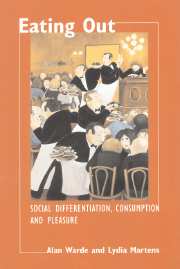Book contents
- Frontmatter
- Contents
- List of illustrations
- List of tables
- Acknowledgements
- 1 Studying eating out
- Part I Modes of provision
- Part II Access
- Part III Delivery
- Part IV Enjoyment: the attractions of eating out
- 8 Eating out as a source of gratification
- 9 The enjoyment of meal events
- Part V Conclusion
- Methodological appendix: data collection and analysis
- References
- Index
8 - Eating out as a source of gratification
Published online by Cambridge University Press: 22 September 2009
- Frontmatter
- Contents
- List of illustrations
- List of tables
- Acknowledgements
- 1 Studying eating out
- Part I Modes of provision
- Part II Access
- Part III Delivery
- Part IV Enjoyment: the attractions of eating out
- 8 Eating out as a source of gratification
- 9 The enjoyment of meal events
- Part V Conclusion
- Methodological appendix: data collection and analysis
- References
- Index
Summary
Much of the sparse analytic literature has tended to be highly critical of the nature and standards of eating out in Britain. Restaurants are condemned variously for the quality of the food from a gastronomic point of view (e.g. Driver, 1983), for standardisation accompanying the introduction of mass production techniques (e.g. Wood, 1994a) and for offering oppressively inauthentic contexts for social interaction (Finkelstein, 1989). Indeed, there are many reasons for anticipating negative reactions towards eating out experiences. There is evidence of appreciable ambivalence about food in general. Thus Lupton (1996:143) reports that ‘some interviewees demonstrated an overwhelming interest and enjoyment of food; others seemed to have very little interest in food, viewing it simply as a way to survive rather than a source of pleasure’. Similarly, Purcell (1992) found a significant proportion of her Oxford sample considered food nothing more than a biological necessity: food is merely fuel. In addition, there is widespread current concern not to be overweight which, in extremis, manifests itself in serious food disorders, suggesting that occasions which require more eating may be unattractive (see Bordo, 1993). Furthermore, much concern is expressed that many British foodstuffs are potentially damaging to health; there is considerable suspicion of the food production system which might make eating in restaurants, where one is ignorant of the sources and qualities of the raw ingredients, seem particularly risky. Finally, English food has not traditionally had a reputation for excellence, rather the contrary.
- Type
- Chapter
- Information
- Eating OutSocial Differentiation, Consumption and Pleasure, pp. 169 - 190Publisher: Cambridge University PressPrint publication year: 2000



